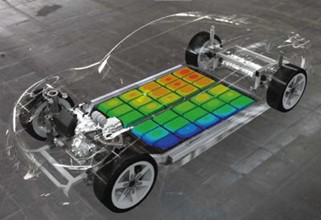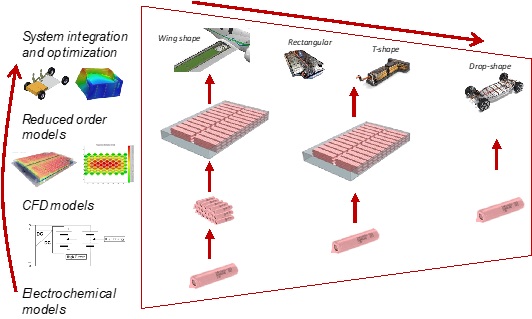
Developing high-energy and power-dense battery packs cost-effectively and sustainably is crucial for enhancing battery systems' performance, longevity, and safety while reducing environmental impact. There is no universal battery topology; the layout and shape significantly affect overall performance. Research focuses on automated creation of simulation models for various modular pack topologies, including thermal subsystems like cooling plate connections, to analyse electrical and thermal responses, essential for fast charging. This research includes single and multi-cell chemistries and considers thermal, safety, operational, and other system constraints to optimize cell-to-vehicle integration and electric vehicle performance. Applications range from cars, trucks, and buses to drones, planes, and ships, and is conducted by the Control Systems Technology group of the Department of Mechanical Engineering.

Vehicle-Level Modelling and Simulation
Modelling battery packs presents challenges in mechanical, electrical, and thermal properties: i) Ensuring structural integrity while minimizing weight is critical. Mechanical stresses from vibrations and impacts can affect longevity and safety. Accurate modelling must account for materials, cell arrangement, and packaging; ii) Electrical performance depends on cell arrangement and interconnections. Variations in cell performance can lead to inefficiencies and failures. Modelling must consider resistive losses, cell balancing, and battery management systems; iii) Managing heat generation and dissipation is vital for efficiency and safety. Thermal modelling involves simulating heat generation, thermal interactions, and cooling systems. Advanced simulation tools and interdisciplinary expertise are essential for optimal performance.

Control and Design Optimization of Batteries and Electric Vehicles
Optimization methods integrate disciplines to enhance energy density, thermal management, safety, and cost. Multi-physics simulations and surrogate models efficiently explore design parameters, while advanced algorithms like genetic algorithms and machine learning identify optimal solutions, balancing trade-offs such as weight and thermal performance. Modular battery designs offer flexibility, scalability, and easier customization, accommodating different cell chemistries. Battery thermal management systems (BTMSs) ensure optimal temperatures and longevity by optimizing cooling methods, materials, and heat distribution. Mechanical design optimization minimizes battery pack mass while maintaining structural integrity. These integrated approaches are crucial for developing efficient, safe, high-performing battery packs for electric vehicles and energy storage systems.